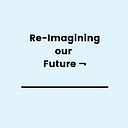Re-Imagining our Systems
For some time now we’ve known that things were changing. Really, the writing has been on the wall since the Club of Rome paper, Limits to Growth in 1972. Now in 2020, when we look out the window and see empty trains, buses and pubs, restaurants, theatres, the change that is happening cannot go unnoticed.
Since the industrial revolution, we have been pretending that humans were part of the machine, that the economy could grow eternally and that we could fix whatever was going wrong with the Earth like it was some kind of complicated machine, that we are all cogs in. Now, the top down, hierarchical ways or organising ourselves is fraying at the edges as are the communities that we used to live in all our lives.
People communicate with one another online anywhere in the world on Zoom, the phones in our pockets give us superhuman powers of knowledge, and the limitations that we used to face when it came to long-distance-communication with other people now continue to stretch further and further resulting from various inventions stemming from the telegraph, radio and internet. Knowledge exchange and communication are now so ubiquitous that no-one is in control of who talks to who. As they say, The times they are a-changin.
In fact they are changing so fast that we are not able to keep up with them. According to Martec’s Law, technological change is happening exponentially while organisational change is happening logarithmically. The only way that we can hope to adapt is to change how we think about the world around us and how we organise ourselves in relationship to it. We have to move towards a networked society, where we become part of a complex, shifting ecosystem of interconnected systems that all influence each other. By looking at the structure of the system that we make up a part of we can see our role in it in a new light, which can bring new insights. We see the world not as a machine that is breaking, but rather as living systems that have flows, gaps and blockages that need to be cared for and nurtured, rather than separated and fixed.
A good example of the benefits that can be achieved by taking this approach can be seen in the success of Dutch health care organisation Buurtazorg, which uses a fractal approach to scaling agile collaboration based on self-managing teams of 12 people. Buurtzorg teams are entrepreneurial in spirit, continually improving the organisation and services. The organisation has grown to employ over 10,000 nurses, delivered savings of around 40% to the Dutch healthcare system and reduced the number of hours of care needed by 50% while improving the quality of care given and increasing the level work satisfaction of their employees. It’s good to see that the model’s success is being exported to 25 countries around the world and it seems to be an approach whose time has come.
Fritjof Capra says the current situation we are in is a symptom of humanity’s collective crisis of perception. We have become imbalanced. Our systems have become complicated, not complex. If you burn a house down it will not grow back, whereas if you burn a forest down, it will grow back. The natural environment can serve as one of our best teachers. We need a new set of values to guide our systems.
We need values that more closely reflect the innate characteristics of nature: diversity, creativity, collective intelligence, spontaneity, feedback, emergence, dynamic balance etc. To regain balance we need to place more emphasis on the intuitive (as opposed to the (aott) rational), cooperation (aott competition) the nonlinear (aott linear), conservation (aott expansion), and quality (aott quantity).
Our values inform our beliefs, and our beliefs create our perception of the world, and subsequently, our actions. Perception is developed through experience. What if we created more room for experiences that are inherently diverse, creative, cooperative, intuitive, nonlinear etc. What if we re-structured civilization to achieve this. What would our relationships look like? Would schools as we know them exist? Would there be a money system? What would our communities look like? What about our homes? Would there be doctors? What skills would be most coveted? What character traits would be most prevalent? Would there be more women leaders? Would there be more creativity and less depression?
Values → Beliefs → Perception → Actions → Experience (rinse and repeat)
Lead Author: Colin Campbell
Colin Campbell is CEO & Founder of Unlocking Potential by Nectis Ltd. Colin has 20+ years in company ecosystem development in a vast array of different business & international contexts.
Unlocking Potential is a software tool that leverages advanced people analytics to increase workforce agility in business as they scale. This approach to business agility includes: eliminating redundant actions and bottlenecks to productivity, while improving performance, communication flow, decision making, innovation, trust and collaboration. Unlocking Potential is an approach to deliver fast, inclusive agile transformation. We do this by leveraging big-data & people analytics for company ecosystem optimisation, customised to each business.
Anchor Author: Daniel Rudolph
Daniel Rudolph is interested in exploring alternative, experiential learning opportunities for people of all ages. He is passionate about forming community, and building public spaces for meaningful, transformational gathering. Currently he is spending a lot of his time learning juggling and facilitating gatherings. He also enjoys writing and sharing poetry. Daniel is a very curious and playful person and is always open for creative collaborations.
